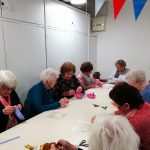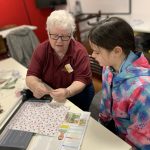
This Monthly Roundup features Lego building, gardening, make-up, gaming and cookery! Read on to catch up with all that has been happening at The Devil’s Porridge Museum.
Monday 17th June
Cordite club was back on again today. We were delighted to be joined by Eastriggs nursery this week. To learn more about Cordite Club please click here>
Our free Arts and Crafts club for young people was on again today. A huge thank you to everyone who makes this possible and those who come along! Find out more about Arts and Crafts club by clicking here>
Tuesday 18th June
Fantastic to have another group visiting The Devil’s Porridge Museum today. Please be aware that it is essential to book group visits in advance. You can learn more about group visits by clicking here>
Thursday 19th June
We were delighted to welcome a school to The Devil’s Porridge Museum today. If you are interested in learning more about school visits please click here>
Our second group visit of the week also visited the museum today. It was brilliant to have them. Learn more about group visits here>
Friday 21st June
Brilliant to have another group visit at The Devil’s Porridge Museum again today. Please remember that it is essential to book group visits in advance. Learn more about group visits here>
Saturday 22nd June
Our free Gardening Club is for young people with our gardening expert Wendy is on on Saturdays. They have grown some excellent rhubarb so far! If you fancy joining us, you can learn more about this by clicking here>
Our Dig For Victory Garden is looking very good due to their hard work. Take a look at some photos of the garden below.
Today also marked our last group visit of a very busy week. Thanks to them for joining us! You can learn more about group visits by clicking here>
Monday 24th June
A school came to visit The Devil’s Porridge Museum today. It was fantastic to have them. Learn more about school visits here>
Our Arts and Crafts club was on again today. Learn more about this by clicking here>
Tuesday 25th June
Our youth council had a meeting to try out a World War One recipe for an upcoming project. Thanks to all of them who came along!
Some photos of making these biscuits can be found below.
Wednesday 26th June 2024
Today The Devil’s Porridge Museum’s Curator and Youth and Community Engagement Officer went to represent the museum at Longtown MOD for Armed Forces Day.
Thursday 27th June
Excellent to have another group visit The Devil’s Porridge Museum today. Find out more about group visits here>
Saturday 29th June
Today The Devil’s Porridge Museum’s gardening club was busy in our Dig for Victory garden again today. Please click here to learn more about this>
Our gardening club have even been growing some wild flowers in certain areas to encourage pollinators like bees!
Our Curator and Youth and Community Engagement Officer were representing The Devil’s Porridge Museum at Armed Forces Day in Carlisle. Take a look at some photos of this event below.
Monday 1st July
On the first day of July it was excellent to welcome a group visit. We would be happy to provide catering for your group visit, but this does need to be booked in advance. Find out more about group visits by clicking here>
Thursday 4th July
Our free Summer Holiday programme for young people started today with a Minecraft- Inspired Lego Building Competition. It was amazing to see what the young people who came along created out of Lego! There were so many creative designs that our judges found it very hard to choose our third, second and first place prize winners. The second and third place winners won Lego Minecraft magazines, while first place received a Lego Minecraft set. We loved all the Lego builds so much that we gave all the young Lego Master Builders who came along certificate and a little badge!
Brilliant to have some of the young attendees join us for a free breakfast before this workshop too. Below are some photos of this activity.
Friday 5th July
Today’s free workshop was 1940’s retro Make-Up workshop. It was lovely to have so many young people come along and fantastic to have some join us for a free breakfast before this workshop too.
Some photos of this workshop are coming very soon.
Saturday 6th July
Gardening club was on again today. It was fantastic to see the young people learning new skills. You can learn more about gardening club by clicking here>
Take a look at some of what they have been growing in the photos below.
Monday 8th July
Today we had a Mini Anderson Shelter craft workshop. It was brilliant to have young people to join us for this free activity and it was great to see some of them at our free breakfast before the workshop too.
Photos of this activity are coming very soon.
Tuesday 9th July
Today we had another group visit to The Devil’s Porridge Museum. It was brilliant to have them. Click here to learn more about group visits>
Thursday 11th July
We had our free Retro Gaming Contest today with a Super Nintendo game console. Brilliant to have so many enthusiastic young people join us for this and it was lovely to see some of them at the free breakfast before the workshop. Below are some photos of this activity.
Saturday 13th July
Our free gardening club was on again today. Thanks to our gardening expert Wendy and all the young people who come along! To learn more about gardening club, please click here>
Doesn’t our Dig For Victory Garden look good? Below are some photos of it taken recently.
That’s it for this Monthly Roundup! We’ll be back for another Roundup in June. You can read our last Roundup by clicking here> We still have lots of free Summer holiday activities for young people coming up, so be sure to take a look at our events page by clicking here>


















































































































































































































































































